India and Pakistan: Another Door Closed
The barrier that remains

NEW DELHI: For the media in India and Pakistan, Saarc was all about a Modi-Sharif meeting and little less. Speculation whether the two Prime Ministers would meet continued till the nth hour, with even a formal handshake and the exchange of a few words as is courtesy when heads of nation meet anywhere in the world meriting special media attention and comment.
In the process the summit slipped into the background, as did the efforts by member countries to bring in China as a full fledged member. It is almost clear now that this summit has prepared the ground, and by the time Saarc meets again China’s assertive diplomacy might make it impossible for India to hold out as a minority of one in the region. Most Saarc countries are rooting for China and even if Sri Lanka and Bangladesh preferred to keep silent on the issue this time, they are certainly not going to oppose its entry into the forum.
Pakistan, according to its officials and media, pushed hard for a bilateral meeting with back channel efforts, however, not bearing fruit. Instead the exchange of fire at the Line of Control became more intense, with an Indian soldier being killed in an encounter with terrorists along the international border.
It is not clear whether there will be any let up in the hostilities between India and Pakistan, with New Delhi showing no signs of a give in the current stand of. Saarc was seen as an opportunity to re-open the door but clearly Prime Minister Narendra Modi has decided not to move ahead on this front. The opportunity provided by the United Nations General Assembly for a bilateral side meeting was also not utilised.
There seems to be a drift in the situation, with the LoC remaining tense, and little else moving on the ground. Pakistan has been continuously pointing towards the decision by its Prime Minister Nawaz Sharif to attend the swearing in ceremony of PM Modi, despite domestic advise that in doing so he would be in danger of being one of the many in “big brother’s court.”
Islamabad, according to sources, does not believe that the decision to call off the foreign secretary level meeting was in response to the Hurriyat leaders meeting with the Pakistan High Commissioner to India Abdul Basit. This was described as a “routine” meeting with the sources maintaining that it could have been discussed earlier and a decision taken, instead of a public and last minute “ultimatum” by India. This, the sources said, has now forced Pakistan to take a “we will talk to Hurriyat no matter what” position, and placed India in the “you better agree or no talks” perch.
In the process talks with the Hurriyat that had been agreed upon by earlier governments have become central to the bilateral dialogue between India and Pakistan, and since the latter cannot agree officially to suspend the dialogue with the Kashmiris, no one now is in a position to predict when and if the talks will take place. As the sources said, “it is now for PM Modi to determine the time and the place as PM Sharif is more than willing.”
Saarc as a process has been effectively stalled, as the Kathmandu summit showed with the countries unable to move forward with little more than the usual rhetoric about poverty and development, and a few agreements that are certainly not path breaking in any sense of the word.
The media, however, remains fixated on a meeting that is not taking place. This was clear from the beginning as no forward movement was registered between the two sides over the past days to facilitate this. However, Track 2 initiatives continue with military and foreign office retired officials of India and Pakistan meeting under the umbrella of the “Ottawa dialogue; and more recently the Regional Peace Institute co chaired by Congress MP Mani Shankar Aiyar and Pakistans former foreign minister Mahmood Kasuri now with Imran Khans party that brought civil society representatives from both sides together.
Interestingly two BJP members participated from India one a former diplomat Ambassador NN Jha and ideologue Sudheendra Kulkarni. Former Congress ministers Salman Khursheed and Sandeep Diskhit were also part of the deliberations that focused on peace and the absolute need for both India and Pakistan to continue the dialogue to resolve their differences. The meeting was agreed that war was no solution, nor were tensions and hostilities, and it was imperative for the two governments to re-open the dialogue and take it forward.



